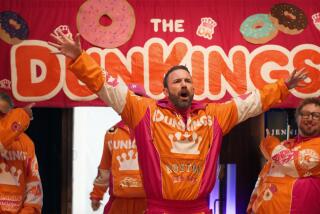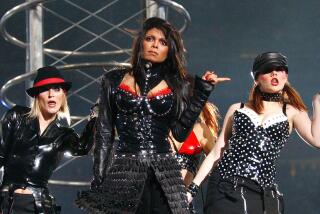This Super Bowl Doesnât Need a Crowd
In Munich, 1972, sports changed, very much for the worse. Up until that time, sports was looked upon as a carousel of sorts, children at play, detached from earthly events.
Then one morning at the Olympic village in Munich, terrorists broke into the Israeli compound. The first person confronting them was the Israeli wrestling coach, a Moshe Weinberg.
They shot Moshe dead. His niche in history is grim--the first man murdered in the 2,600 years of the Olympic Games.
Others that day would die, too, and the paradise island on which sports romped would be an island no more.
At Innsbruck and Montreal, 1976, police shouldering machine guns would be seen patrolling the Olympic villages.
IOC members at Sarajevo, 1984, lived at a Holiday Inn, sealed so tight that an outsider couldnât even enter the lobby. An armed guard rejected us. When we complained, he called a second armed guard, who said yes.
Now, with the count even, they called a third armed guard, a tiebreaker. He said no. In a long and distinguished life of crime, we had experienced our first ousting from a Holiday Inn.
At the Olympics in Los Angeles, 1984, more than $150 million was spent on security.
Now, with the Super Bowl at Tampa, Fla., next weekend, security becomes a matter of vital concern again. Thought is given to whether terrorists will try something ugly at Americaâs most visible sports event.
The dilemma confronting those in charge isnât to be envied. One isnât eager to be stampeded into fear. But one isnât eager to get reckless, either, especially if 74,000 are packed into a stadium for what will be a night game, beginning at 6:18 EST.
So whatâs the solution to the Super Bowl problem? Should the game go on?
The answer is yes, but without the 74,000 in the stands. And without the night starting time.
The game should be played at 1 p.m., entirely for television. Maybe the sporting press could be admitted. But it isnât necessary to create a safety risk for the thousands of spectators.
Could the players perform without a live audience? Why not? At training camps, teams engage in controlled scrimmages every year, quite without cheering onlookers and with no one to boo the quarterback.
If egos require an audience, the players can be assured that maybe 75,000,000 are watching at home.
But what would happen to all those tickets sold at list price of $150 each?
The league would refund the money, thatâs what. War is hell.
Money also would be refunded to those renting corporate tents on the parking lot for the purpose of serving pregame cocktails and buffet to associates and customers.
Often at these functions there are balloons and music. All would be sacrificed, the towering price of war.
By shifting kickoff to 1 oâclock, the league also would have to refund money to television, employing scientists whose research shows that starting a game at 6:18 p.m., Eastern time, sets up maximum figures in the ratings, more vital to television than air and water.
âDid we lose the war?â you ask.
âWorse,â you are told. âWe fell three points in the Nielsens.â
The World Series, the Rose Bowl and pro football championship games were staged in pretty much their normal fashion during World War II, but that was before Munich, â72.
Nor was television a serious entity at that time.
In connection with pay TV, we have heard for years about sports events before studio audiences.
For the coming Super Bowl, you even can drop the studio audience.
Of course, the Chamber of Commerce in Tampa would be heard from, pointing out how a game without fans would water down the millions in business a Super Bowl brings into the community. In time of war, what greater tragedy?
When the bloodletting breaks out the other day, a young guy is interviewed on Wall Street, where he assures TV watchers it is a good time to buy. Lots of great values.
Immediately after the first air raids, the market shoots up 114 points. At dayâs end, on the floor of the New York Stock Exchange, a rousing cheer erupts. Our fliers have to be delighted. One no doubt says: âFor what other purpose are we in the Gulf?â
There is something else yet to be said about a Super Bowl with no fans. The offenses would be helped, no one around to drown out signals.
More to Read
Go beyond the scoreboard
Get the latest on L.A.'s teams in the daily Sports Report newsletter.
You may occasionally receive promotional content from the Los Angeles Times.






